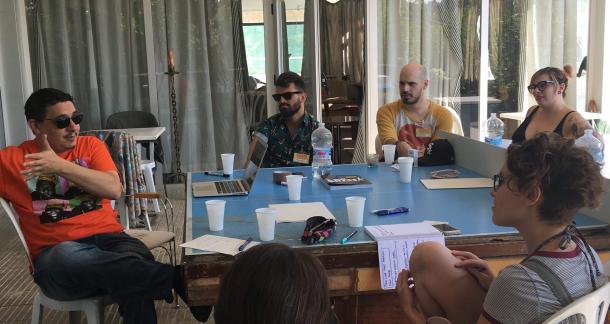Teaching My First Writing Class

There was a time when I thought I would never teach a writing class. It was about 7 years ago, and I had just finished my MA in creative writing. I was nowhere near close to having my manuscript ready for publication and feared I'd gotten a useless degree. I told myself that if I wasn't able to get my own work published I wouldn't be able to help anyone else with theirs.
But learning to write isn’t just sitting in a classroom or joining an online group; sometimes it can be hanging out at a diner with another writer.
Though it looked like my writing goals might never be achieved, I lucked out in getting a well-paying job that helped me move to NYC. I kept writing without much luck, but things changed when I saw a guy sitting at a counter going over notes for a script—Right away I knew I needed to talk to him. The guy ended up being writer and documentary filmmaker, Stephen Mitchell. We hit it off and started meeting at the Odessa Diner in the East Village on Saturday’s to talk storytelling craft.
Then something interesting happened—the more I learned about craft, the more I wanted to read, and the more I wanted to read, the more I wanted to write. The quality of my writing—both fiction and non-fiction—started to improve. I got on a real roll, feeling some genuine confidence, and wrote pieces that would end up being part of my first book, The Passion of the Christoph, which would go on to win an Orangeberry Humor award. I wanted to help other writers and began freelance editing, which led me to become the managing editor of CLASH Books.
Through all this, I stopped thinking about teaching. But when I signed up for a literary conference in Barcelona, I got excited about the idea again. The biggest reason why I agreed to run a class in Barcelona was because I felt like I had something to teach. It had been 7 years since that first meeting in Odessa, and I was ready to give something back to the writing world.
When I arrived at the con, I was a little nervous about the class. Not only was it my first time teaching, but English was everyone’s second language. But once the class started, the cliché of clichés held true—storytelling is a universal language. The class had writers of all levels and I shared with them how to build a book from the ground up.

All the craft books I nerded out on with Stephen came into play, and I mixed that knowledge with my own writing and editing experiences. I shared how to outline, why character is and always will be more important than plot, and how to make your inner and outer stories compliment each other—resulting in fun and fulfilling fiction for both reader and writer.
The authors were having a great time. I was really enjoying myself as well, because I felt like I knew what I was talking about. I think in some way I was reticent to teach because I wanted to make sure what I said had value to a new writer. It was as gratifying to see them absorb storytelling craft as it is sending an edited final draft back to a more experienced writer.
After we went over character development, how to plot and outline a book, and making changes that focus on the mixture of the two, we put everything into practice. As a class, we outlined a book and came up with the main characters. I worried a little that a group of writers trying to collaborate on a single outline would be a disaster. My goal was to duplicate the experience of a writer working out different story options in their head, i.e.: the creative process exteriorized.
And guess what? It was not a disaster! The students grasped how story beats had to compliment character growth and make sense storywise. They came up with the idea of spiders being subservient to humans and the story kept evolving, and wound up becoming a genre-bending erotic thriller titled ‘Who Killed The Spider?’. Though the book might be a very acquired taste, it has a strong plot, protagonist, and great character development. Most importantly, the students came away with an understanding of storytelling craft and an excitement to use it in their work.
Now I am back home, playing catch up on editing and my own writing. I am staying in contact with the students and friends I made in Barcelona. It feels great getting back into the groove of editing and writing, but I am missing the experience of teaching a class. While it would be difficult to conduct a class where I live, in rural New Hampshire, I feel what I did would be easy to recreate online. So who knows, if I’m lucky, maybe I’ll get to teach a LitReactor class one of these days.
0989227820








To leave a commentLogin with Facebook